We partner with bada$$ companies that offer products that help our readers achieve their goals! If you purchase through our partner links, we get paid for the referral at no additional cost to you! Read our disclosure for more info.
Some blogging sites may feel better on your wallet, but many aren’t ideal if you plan to monetize your website. The best blogging platforms to make money are going to differ greatly from the free options.
When you’re just starting a blog, it’s very easy to get overwhelmed by the options that you have to choose from.
You need to choose a blogging platform, a hosting plan, get your domain name, a blog theme, and more.
From free to paid options, there are plenty of blogging websites to choose from. It’s an important decision to make because different blogging platforms have different limitations on how you can make money blogging.
In this article, we’ll review the best blogging platforms on the market to help you decide which one is right for you.
Whether you’re a beginner blogger or an experienced online entrepreneur, we’ve got something for everyone with our comprehensive list.
So let’s get started and dive into the details of each blogging platform!
Before we get into what the best blogging platforms are, let’s talk about what a blogging platform IS and more specifically, how it differs from blog hosting (because you need both).
What is a Blogging Platform?
A blogging platform is the software behind your blog. It’s what allows you to write, edit, and manage your posts.
Blogging platforms are content management systems that help you create fully functional websites without needing to do any coding.
They have integrated features that can handle everything from designing the look of your blog to helping you monetize with ads or affiliate marketing.
The best blogging platforms provide basic tools for creating content like a text editor, drag-and-drop builder, galleries, and embedding options for video and audio content.
Some blogging platforms also offer custom design templates while others allow access to themes stores where users can find professionally designed templates they can modify.
What is a Blog Hosting Site?
A blog hosting site is where your blog ‘lives’ online. Your blogging platform stores all of your content, images, and videos, and your web host is what makes that content visible to others online.
Think about how you upload YouTube videos or podcast episodes online. You need a hosting company to host those video and audio files. Blogging works the same way.
You have a few options when it comes to choosing a web host for your blog. You can opt for a free blogging host like Blogger or WordPress, or you can pay for a more robust service with features like unlimited storage space and custom domain names.
In some cases, your blogging platform and web hosting company can be one and the same. In most cases, it makes more sense to choose a blogging platform and a different blog hosting site because you often get a better service (for a better price) that way.
Whatever option you choose, make sure that it offers excellent customer support so that you can get help if something goes wrong with your blog.
We will explain this in more detail when we go over the blogging platforms and your options for web hosting.
What to Know About Free Blogging Platforms
We will cover a few of the best free blogging platforms in this article, but you should know the limitations of these upfront.
Free blogging platforms are always limited in terms of features, design options, and monetization capabilities.
The first thing to be aware of is that free blogging platforms are designed to be very limited so people upgrade rather quickly when they realize that they need more features in order to grow and be successful.
Don’t Own Your Domain Name
Most free blog sites don’t allow you to use your own domain name on your website.
- Free blog site: createandgo.blogspot.com
- Paid blog site: createandgo.com
This limits your branding potential and may make it harder for people to find your blog.
It also means anyone else is free to purchase that domain name if you don’t.
Limitations on How You Monetize
Many free blogging sites have restrictions on the types of ads or affiliate marketing programs you can use to monetize your website.
There isn’t much point in using a free blogging platform if you can’t make money with it anyway.
Fewer Themes, Plugins, and Customizations
Perhaps one of the biggest limitations, aside form the money, is that free blogging sites often have fewer themes, plugins, and customization options than paid options.
This means that you won’t be able to create the exact look for your blog that you want and you will be limited on integrations for SEO tools and other important software integrations.
This can affect the visibility of your blog in search engines as well as how you make money.
Lower Level of Customer Support
Finally, free blogging sites typically don’t offer the same level of customer support as paid services do — so if something isn’t working properly, you might not get the help you need quickly.
I can tell you from experience how important this is when you are designing your blog and learning how these platforms work. They can be a little technical at times and there is a learning curve.
If you ever have any trouble with your blog or find it inaccessible due to spam or whatever reason, having 24/7 customer support that can help you is absolutely vital unless you pay for a web developer to help you.
11 Best Blogging Platforms to Make Money
Now that you have a better understanding of what blogging platforms are, let’s look at the available options.
- Best blogging platform for making money: WordPress
- Best free blogging platform: Blogger
- Best blogging platform for open-source: Dupal
- Best blogging platform for stores: Wix or Squarespace
- Best blogging platform for eCommerce: Weebly
- Best blogging platform with built-in audience: Tumblr or Medium
- Best blogging platform for large businesses: CMS Hub
- Best blogging platform for selling on online marketplaces: Web.com
1. WordPress
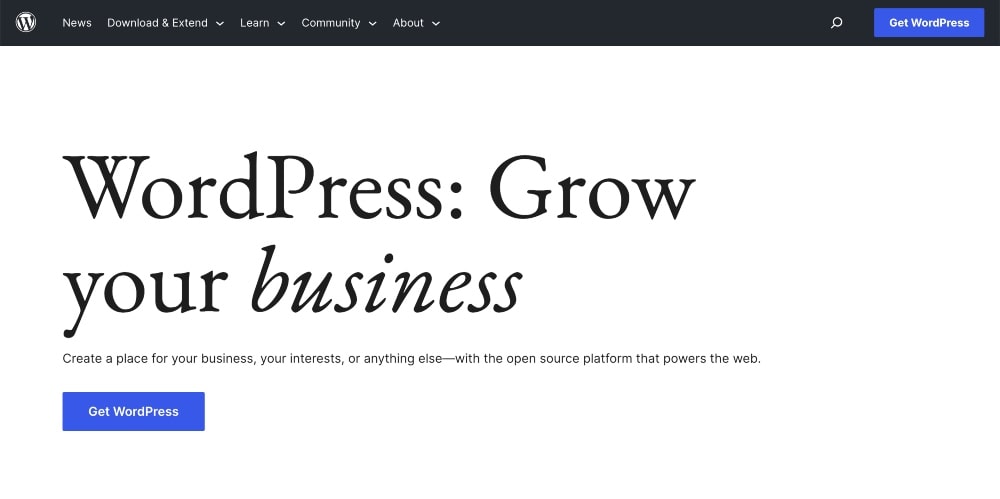
WordPress is one of the most popular blogging platforms on the market and for good reason.
It’s free to use, easy to set up and customize, and offers a wide variety of features that allow you to make money with your blog.
There are thousands of WordPress themes and plugins to help you create a unique blog design. It also has plugins that allow you to add features like affiliate programs, ad networks, contact forms, and more.
You can either host your WordPress site on their server or use a third-party hosting provider, which is what we recommend for ease of use and affordability.
There are also two versions of WordPress: Wordpress.com (free) and WordPress.org (paid).
WordPress.com is a free blogging platform, but if you want increased storage space and custom domain names then you will need to pay for one of their premium plans on WordPress.org.
If you want a free WordPress blog, you will not get access to as many themes or plugins and you will also be limited on how you can make money with your blog.
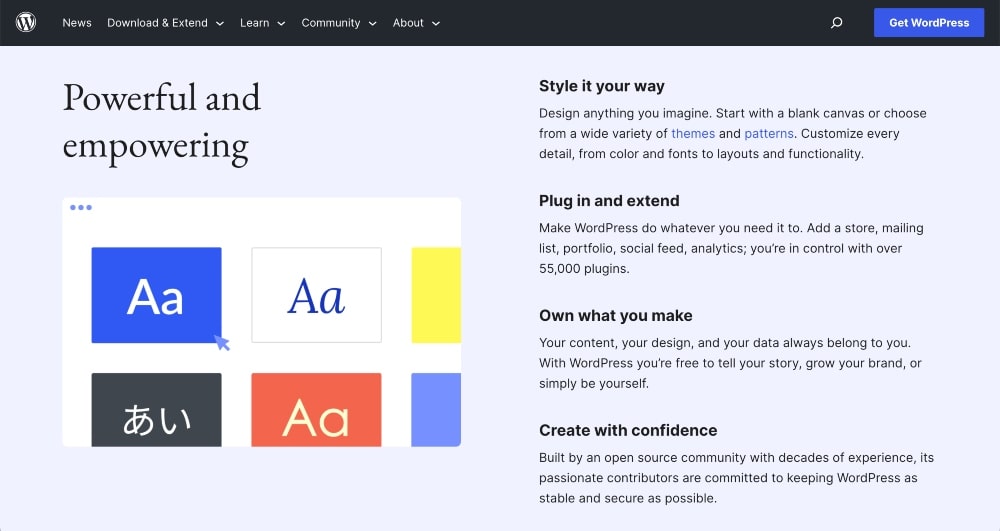
Pros
- More control over your blog design
- Access to thousands of plugins and themes to customize your blog
- Great customer support plus TONS of articles written on using the platform
- Easier to integrate with most other software as you grow your blog
- Own custom domain name
Cons
- A little bit more of a learning curve compared to some other blogging platforms
- You need to handle your security and backups
Pricing:
As low as $2.75/month but varies depending on which blog host you use to host your WordPress blog.
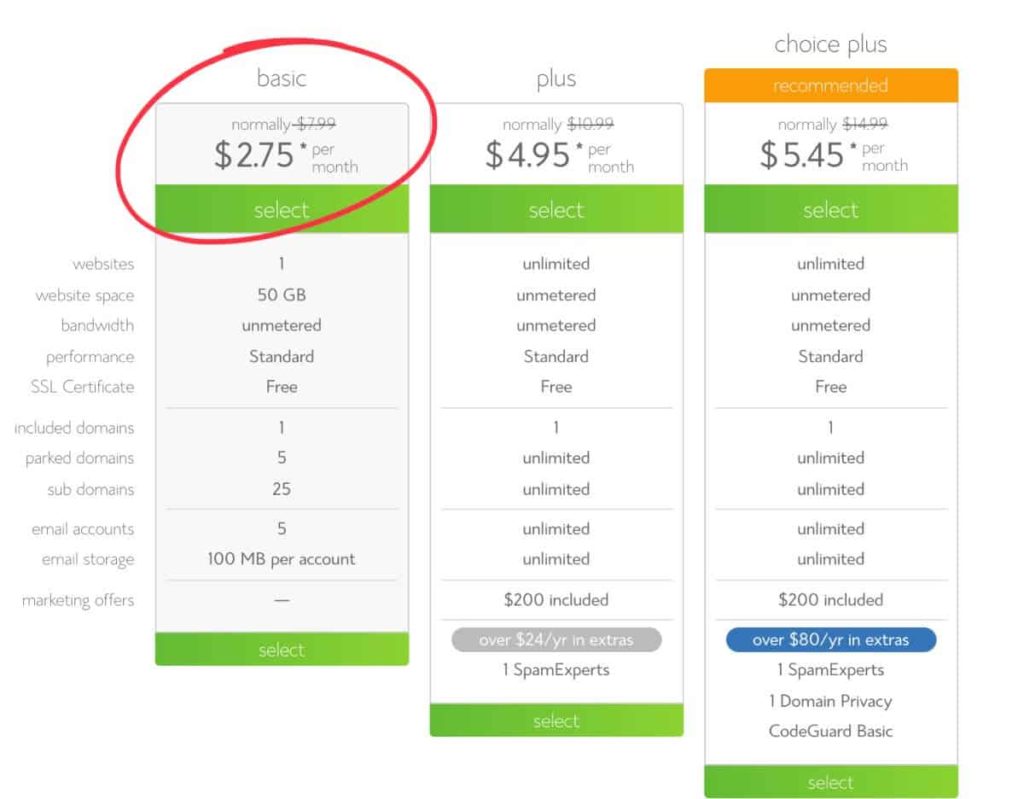
Our Recommendation
A self-hosted WordPress blog is what the vast majority of the highest-paid bloggers on the internet are using. Our blogging students use Bluehost with WordPress as outlined in our step-by-step tutorial on starting a blog.
WordPress + Bluehost offers the best price for customizations, including themes, plugins, and other software integrations.
You can start a WordPress blog with Bluehost for as little as $2.75/month.
2. Wix

Wix is another great blogging platform, particularly for beginners. probably best known for its drag-and-drop software that allows you to create a stunning blog without any coding experience.
This makes it incredibly user-friendly with a much smaller learning curve.
It has hundreds of ready-made building blocks and professionally designed templates that make it easy to customize your blog design, add features like galleries or contact forms, and embed videos or audio content.
You can also start a free blog with Wix, but it is even more limited than the free version of WordPress.
You can sell products on your blog with its shopping cart feature or monetize your Wix blog with ads, affiliate programs, sponsored posts, email marketing campaigns, or other methods.
Most of these advanced features will not be available if you use the free blogging platform.
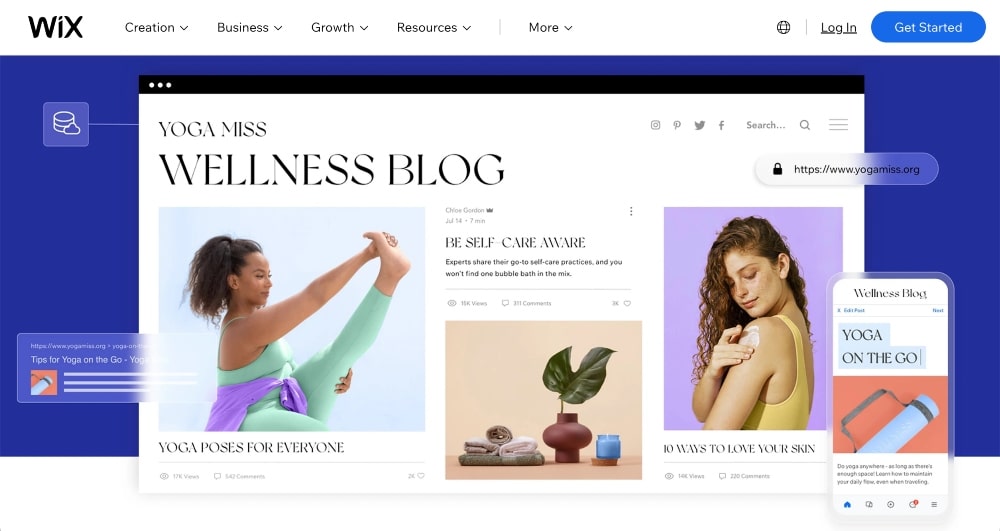
Pros:
- Lots of customization options for designing your blog, although not as many as WordPress
- Easy to use drag-and-drop website builder
- Integrated eCommerce features for selling products on your blog
- Tons of integrations for blogging tools, search engine optimization, blog themes, and more
Cons:
- Limited access to third-party plugins and themes
- Not as SEO-friendly as WordPress
- Plans are less flexible due to lack of hosting options
- Costs extra if you want to build an eCommerce store on your site
- Free version is very limited and includes Wix ads on your site
Pricing:
Wix pricing is $16/month and up, depending on what hosting plan you choose.
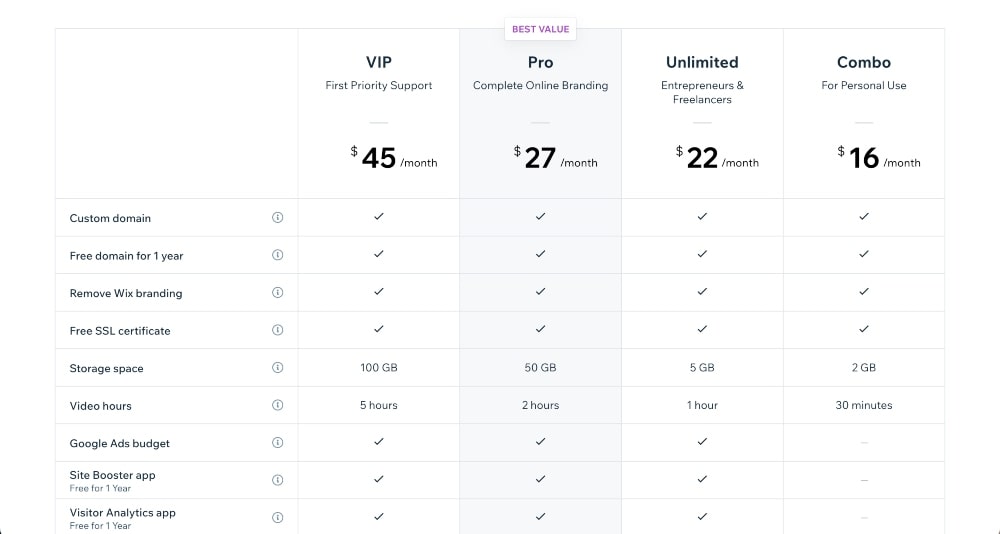
Our Recommendation
Wix is a great blogging platform if you’re just starting out and are looking to get a website up really fast.
That being said, It’s not the best blogging platform if you want to start a successful blog that makes money.
It makes it easy to create a beautiful, functioning blog without having to learn any coding skills.
Wix is better for other websites like for an eCommerce store or traditional, brick-and-mortar store (like a dentist office or hairstylist).
When it comes to blogging, you will ultimately hit roadblocks in your growth due to the limitations of plugins and other software integrations.
3. Squarespace
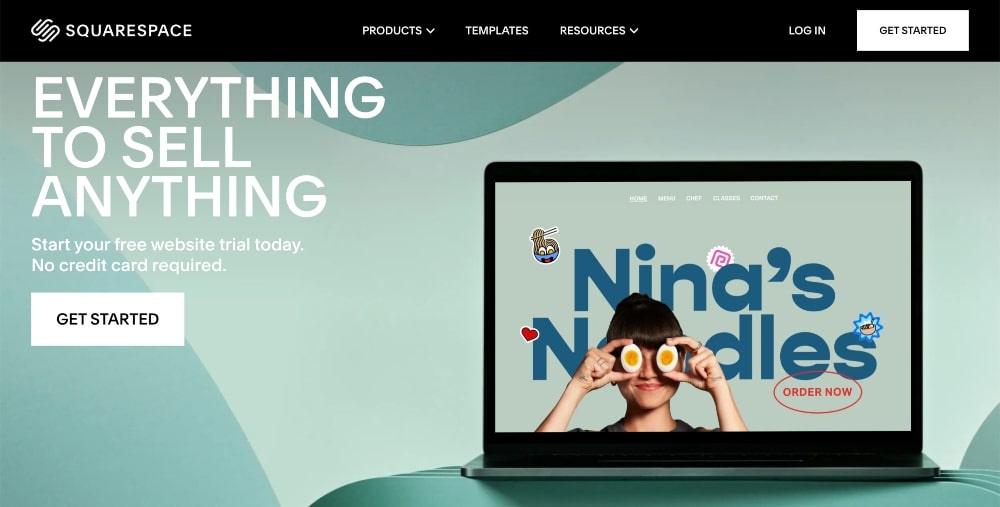
Squarespace is another popular blogging platform for creating a website, blog, or online store.
Similar to Wix, also has drag-and-drop software, making its user interface great for beginners with no prior website design or coding knowledge.
It’s known for its sleek templates and modern design style that make it great for those who want to create an attractive website without needing any coding skills.
You can also use Squarespace to showcase your portfolio, write a journal or share stories with friends and family.
You have several options when it comes to hosting your blog on Squarespace, including paying for their own personal domain name if you don’t already have one.
There are no ads on the free version of Squarespace, so you can’t use this as a free blogging platform if you want to partner with ad networks to make money.

Pros:
- Very easy to use and good for those without coding experience
- Drag-and-drop functionality
- Unlimited storage space, bandwidth, and pages
- Great customer support with live chat
Cons:
- Not as many customization options as WordPress or other blogging sites
- Themes are not as flexible or customizable as other platforms such as WordPress or Wix.
Pricing:
Squarespace plans start at $16/month (billed annually) and go up from there depending on which plan you choose.
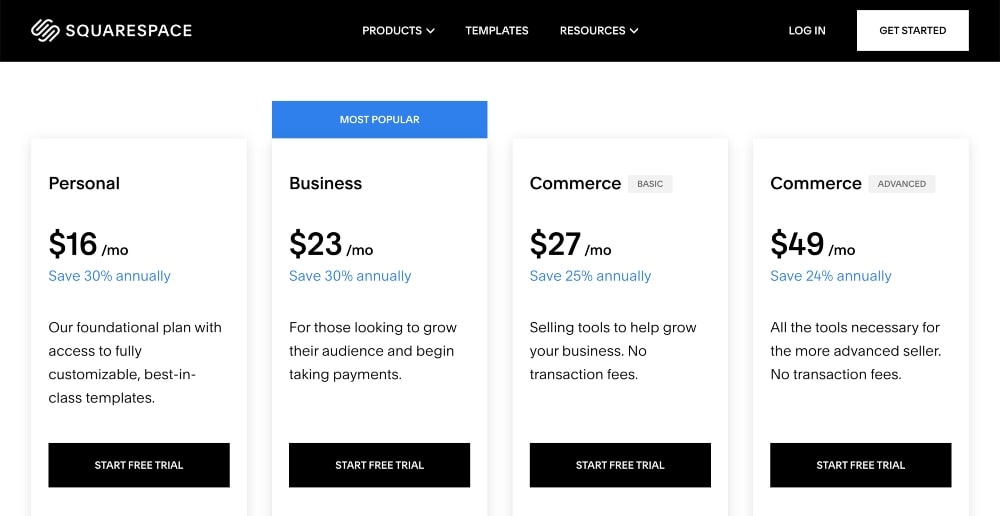
Our Recommendation
Squarespace is a great platform for creating an attractive website, blog, or eCommerce store, however, it is not the best option if your primary goal is to make money blogging.
If you want to make money with your own blog, we recommend using WordPress or Wix. That being said, Squarespace is a great option if you’re running a traditional brick-and-mortar store but still want an online presence.
4. Weebly

Weebly is a popular drag-and-drop website builder for creating an attractive blog or website.
Unlike other blogging platforms, Weebly is not limited to just blogging – you can also create a store, portfolio, or even a forum with the platform’s tools.
It comes with built-in SEO features that can help improve your search engine rankings and get more people to visit your blog or site.
A great feature of Weebly is its mobile app which makes it easy to update and manage your blog on the go.
You can also start a free blog with Weebly without having to pay anything upfront.
However, if you want access to more themes and plugins then you will need to upgrade your Weebly plan.
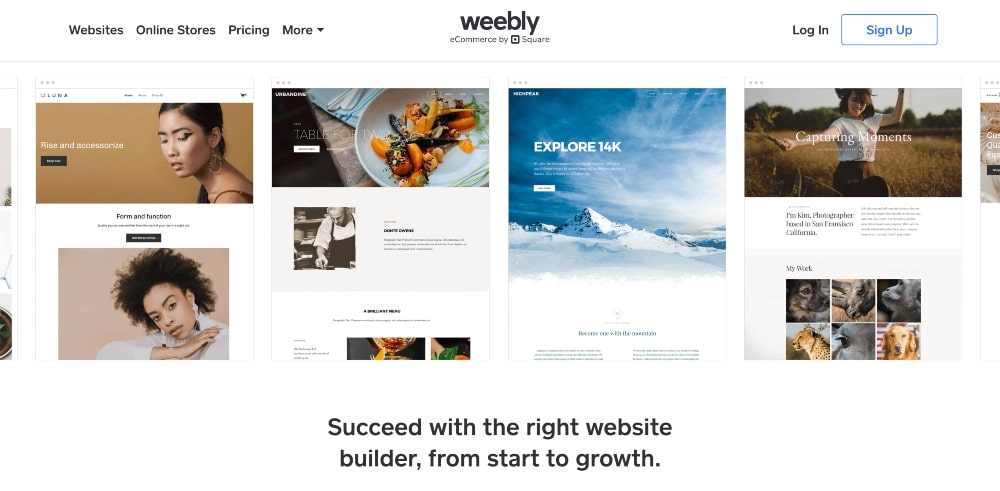
Pros:
- Easy drag-and-drop website builder
- Lots of features for creating a blog, store, or forum
- Built-in SEO tools to improve search engine rankings
- Mobile app makes it easy to update and manage your blog on the go
Cons:
- Very few software integrations available compared to WordPress
- Significantly more expensive
Pricing:
Weebly pricing starts at $10/month (billed annually) and goes up depending on which hosting plan you choose.
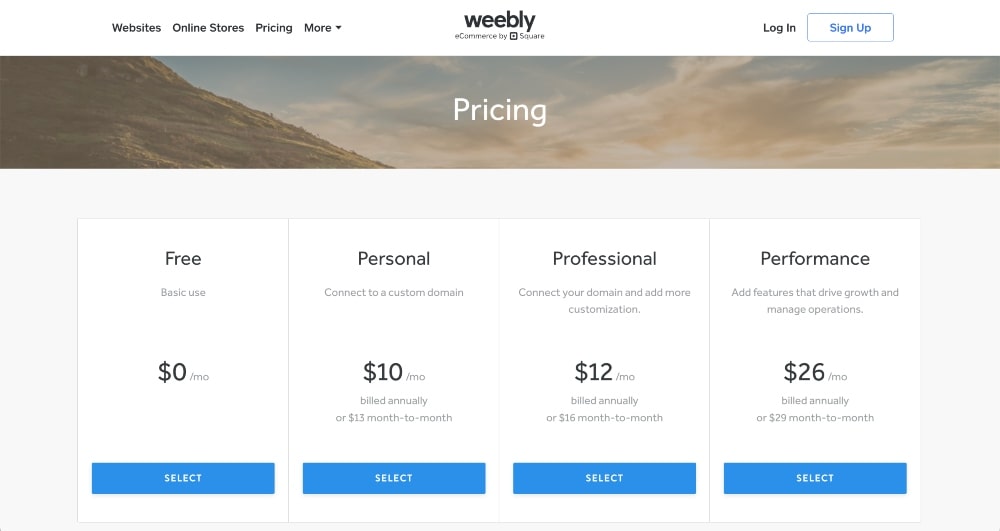
Our Recommendation
Weebly is a great platform for those who want an easy way to create a blog, store, or forum without any coding knowledge.
It’s significantly cheaper than Wix and Squarespace, but it also has a lot fewer customizations, software, and plugins available.
If you need a relatively inexpensive plan with fewer bells and whistles, Weebly is for you. If you want to create a customizable, profitable blog, you’re still better off with WordPress + Bluehost.
5. Blogger

Blogger is an old-school free blogging platform that has been around since 1999.
It’s a free service offered by Google and allows you to create a blog quickly and easily, with limited customization options.
It’s actually one of the best free blog sites to make money because you can connect Google Adsense to it and make money with ads.
Most free blogging platforms don’t allow you to monetize with ads.
It’s a simple and easy-to-use platform that is great for new bloggers not sure if they want to turn their blog into an online business.
However, if you want access to more features and customization options then you will need to upgrade your plan.
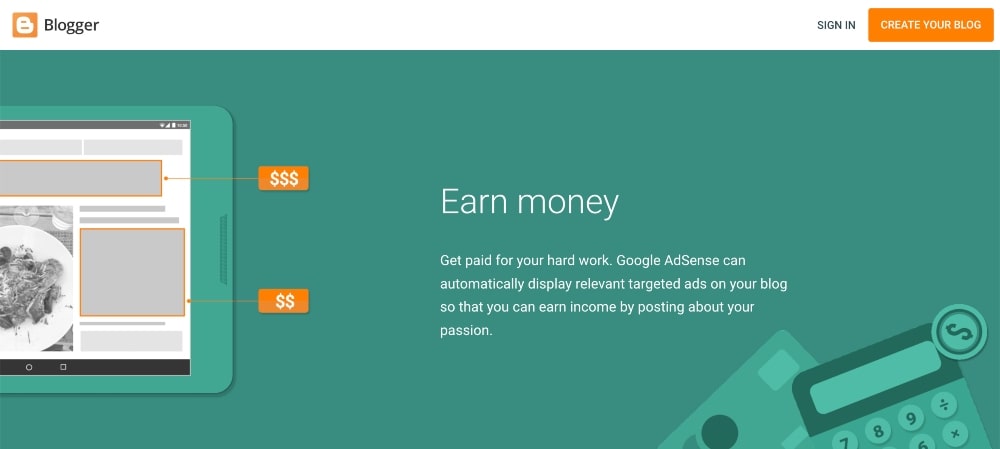
Pros:
- Best free blogging platform to monetize with ads
- Easy to use – no coding knowledge necessary
- Integrates well with Google services, like Google Analytics and Google Adsense
Cons:
- Limited customization options
- Very little access to third-party plugins and themes
Pricing:
Blogger plans are free. You can publish up to 100 blog posts per free account.
Our Recommendation
Blogger is a great free platform for those who are just starting out blogging but not ideal for someone looking to grow and scale a blog.
It’s not very SEO-friendly compared to other blogging platforms like WordPress or Squarespace, and you won’t be able to use many third-party plugins or themes
If you want more control over your blog and the ability to make money from it, we recommend using WordPress.
6. Ghost
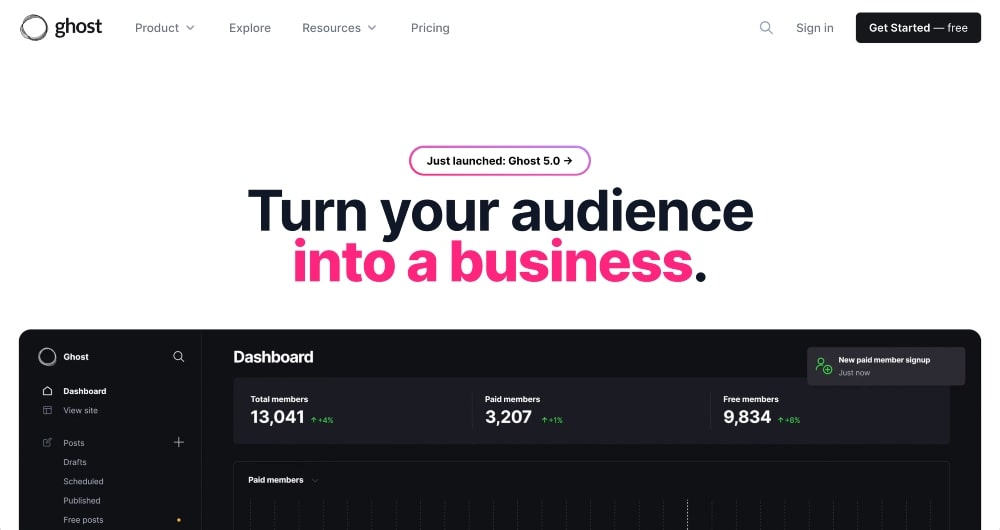
Ghost is an open-source blogging platform that combines the ease of use of Wix with the power and flexibility of WordPress.
It was created in 2013 through a KickStarter campaign and has quickly become the best alternative to WordPress.
It’s a great choice for those who want to create a profitable blog or website without needing any coding skills.
The intuitive content editor makes it easy to format your posts, add images and embed videos with just a few clicks.
It also has features like membership management, analytics, and SEO optimization which makes it a great choice if you want to make money with your blog.
It’s built on modern technologies such as Node.js so you get fast loading times, high security, and scalability which are essential for any high-traffic website.
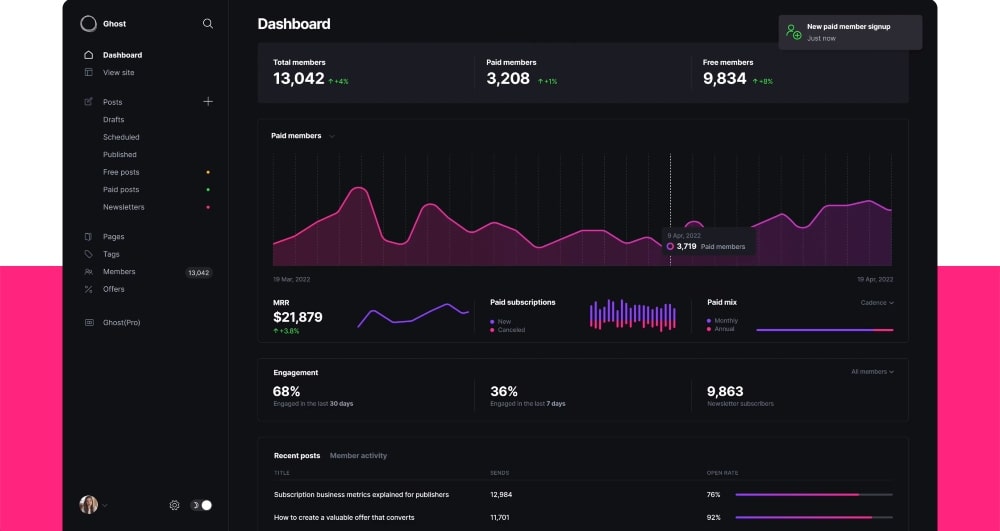
Pros:
- Easy to use – no coding knowledge required
- Modern technologies for fast loading times and security
- Extensive library of themes and plugins for customization
Cons:
- More expensive than other blogging platforms
- Limited customer service options
Pricing:
Ghost plans start at $9/month (billed annually). They also offer a free trial for 14 days.
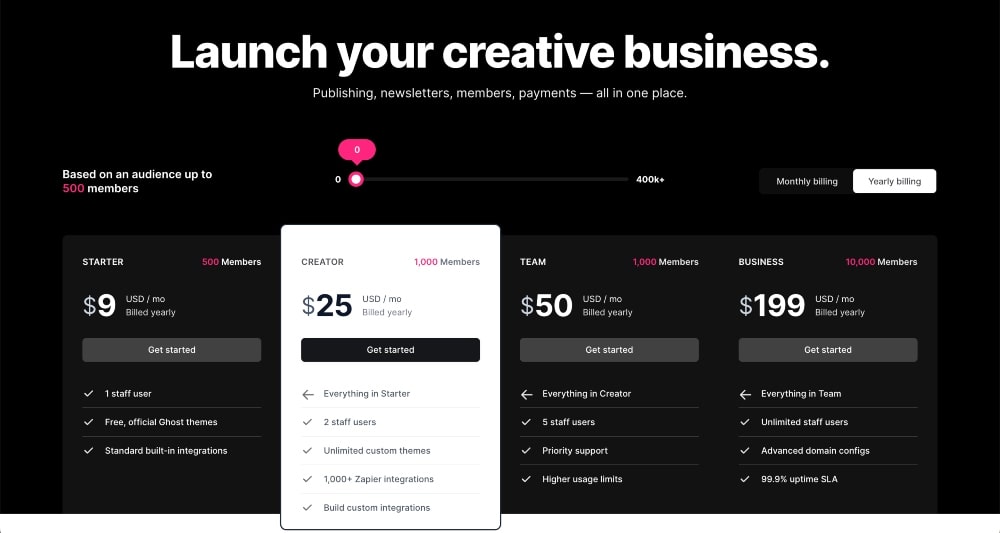
Our Recommendation
Ghost is a great choice if you want to create a professional blog or website without needing any coding knowledge.
It’s more expensive than other blog sites like Wix or WordPress, but it offers the best combination of features and ease of use.
It’s also one of the most secure and fastest blogging platforms available, making it an attractive choice for those who need reliability and scalability.
7. Tumblr
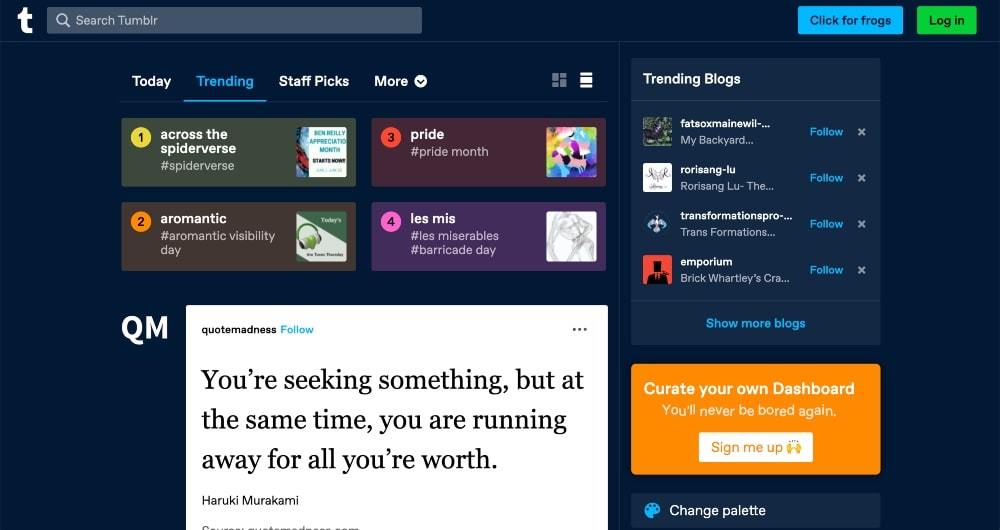
Tumblr is one of the best free blogging platforms that is a great place to network with other bloggers and content is shared regularly in the form of “re-posting.”
This adds an additional way to get exposure to your content that other blog platforms don’t have because it is somewhat of a “social” media platform itself.
Users can follow each other’s blogs and interact with each other through likes, reblogs, comments, and messages.
Tumblr also offers an extensive library of themes so you can customize your blog’s look without any coding skills.
Though it started out as just a blogging platform, Tumblr has evolved into a full-blown social network where users can create their own communities around topics they’re passionate about.
All of this being said, the design capabilities are extremely limited on this blogging platform. You are limited to a set of themes or templates to choose from.
The design and software limitations of Tumblr also make it much more difficult to monetize.
One upside of Tumblr compared to Blogger is that you can purchase your own domain name to use with your site.
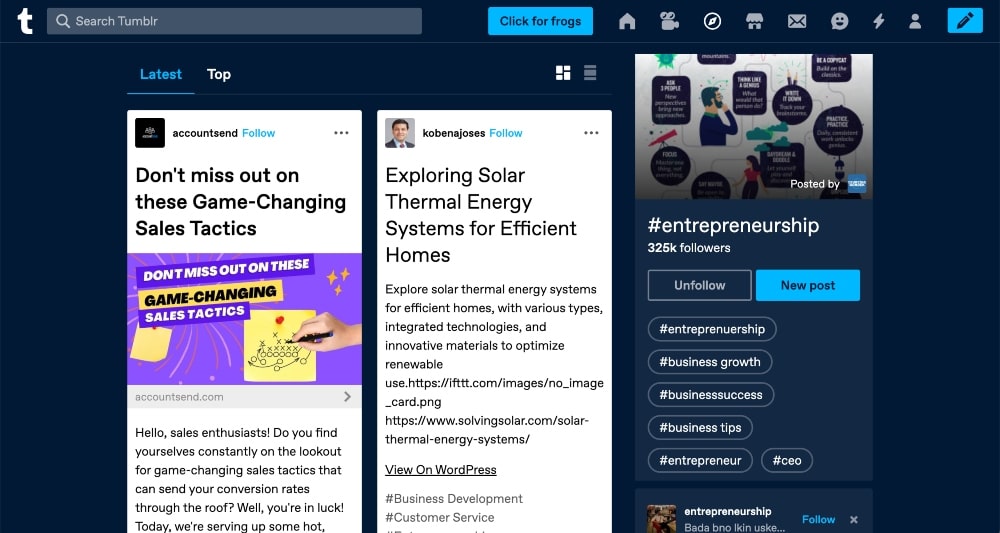
Pros:
- Easy to use – no coding knowledge required
- Existing community with lots of interactions and engagement
- Extensive library of themes for customization
Cons:
- Limited features compared to the other best blogging platforms
- No access to plugins or software integrations
Pricing:
Tumblr plans are completely free.
Our Recommendation
Tumblr is a great choice if you want to create a short-form or hobby blog without needing any coding skills. It’s easy to use and has an active community that can help promote your blog.
However, it does have limited features compared to the other best blogging platforms on this list, so if you need more features then we suggest looking elsewhere.
Still, Tumblr remains one of the best free blogging platforms out there for beginners and hobby bloggers.
8. Medium
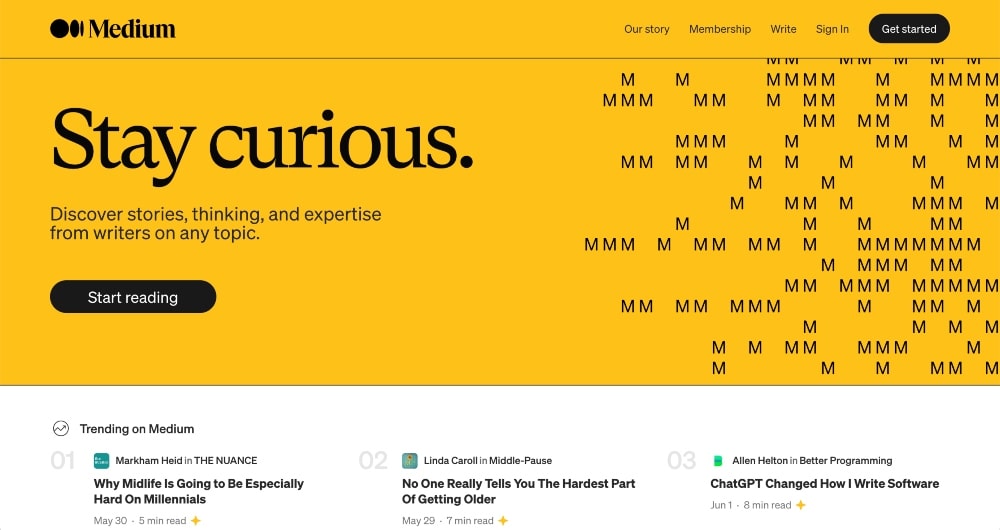
Medium is a blogging platform created in 2012 by the founders of Twitter. It’s an online publishing platform where anyone can write and share their ideas, stories, or opinions with the world.
The platform provides various tools for making posts look great, including easy formatting options and customizable themes. Medium also allows users to create collections around certain topics or interests that they want to follow.
Additionally, the platform offers a built-in audience since all published content is visible to everyone on Medium unless it’s marked as private or unlisted. This makes it easier for new bloggers to get discovered and build relationships with other users.
One of the advantages of using Medium is that it has no ads or pop-ups unlike some other free platforms.
This helps create a better user experience and makes it easier to focus on the content.
Medium’s subscription plan also allows you to monetize your blog by displaying ads and collecting donations from readers.
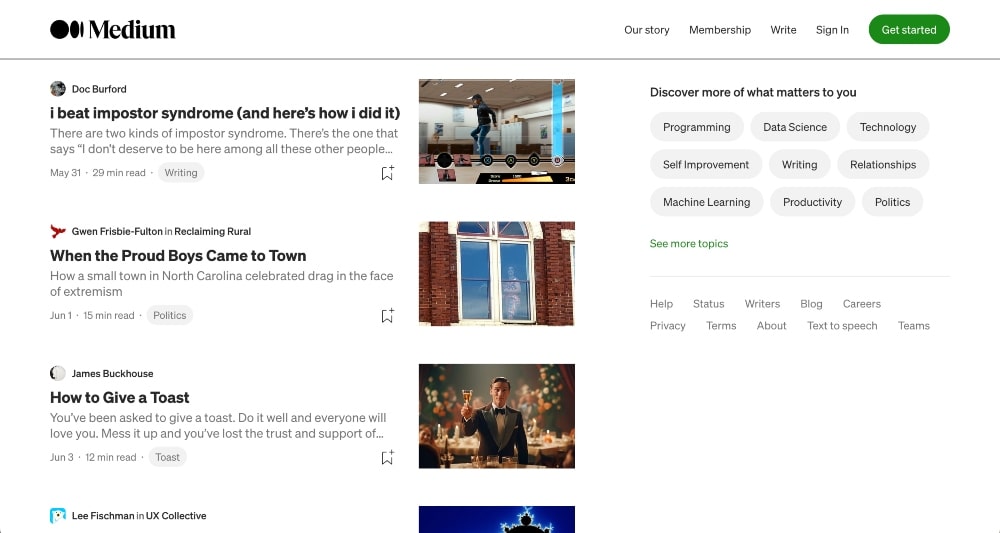
Pros:
- Easy to use and get started
- Built-in blog audience for discovery of new content
- No ads or pop-ups on the free plan
Cons:
- Limited customization options compared to other options
- No access to third-party plugins or themes
Pricing:
Medium plans are free or start at $5/month (billed annually).
Our Recommendation
Medium is a great platform for those who want an easy way to write, share, and discover content. It’s free to use and has no ads or pop-ups which creates a better user experience.
It also has an active community of readers that can help promote your blog, making it easier for new bloggers to get discovered and build relationships with other users.
The downside is that there are limited customization options compared to other blogging platforms such as WordPress or Ghost.
9. CMS Hub
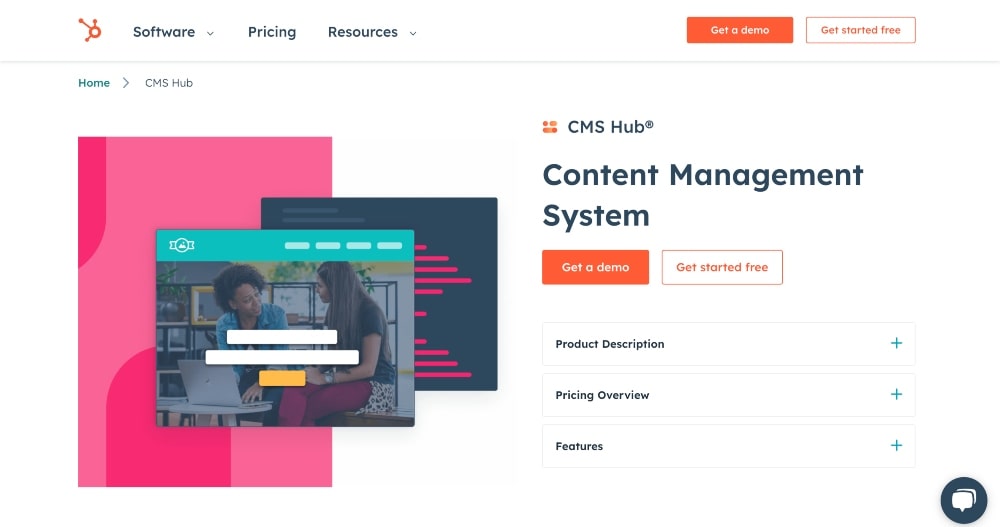
CMS Hub is a website builder and blogging platform created by HubSpot.
It’s designed to be an all-in-one content management system for businesses and organizations of any size.
With this blogging platform, you can create custom pages, blog posts, email campaigns, and other types of content with its drag-and-drop editor.
It also offers hundreds of customizable templates as well as advanced features like membership management, analytics, SEO optimization, and more.
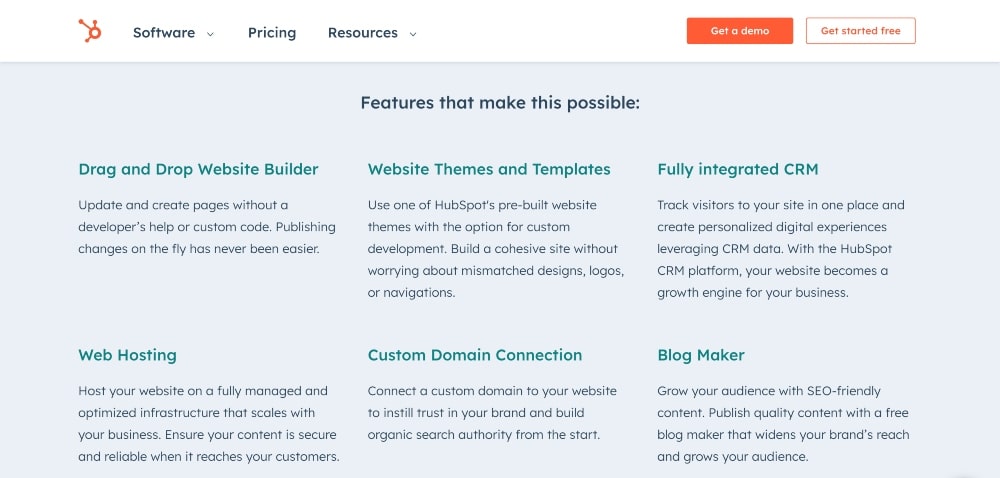
Pros:
- Drag-and-drop website builder
- Built-in SEO tools
- Multi-language variations of your blog
- A/B split-testing
Cons:
- Much more expensive than other blog platforms
- Not ideal for small businesses or bloggers
Pricing:
CMS Hub plans start at $23/month (billed annually).
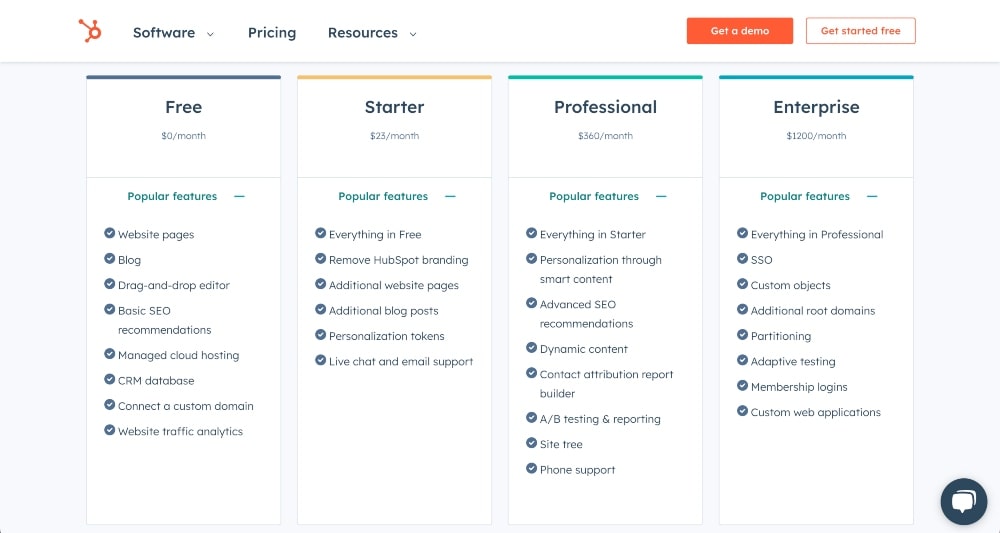
Our Recommendation
CMS Hub is a great choice if you need an all-in-one platform for your business or organization.
It’s far more expensive than other blogging platforms but may make sense if you’re running a large business or already using HubSpot tools.
It’s also one of the most secure and fastest modern CMS’s available, making it an attractive choice for those who need reliability and scalability.
If you’re looking to start a blog on your own, a self-hosted WordPress blog is still a much better way to go.
10. Drupal
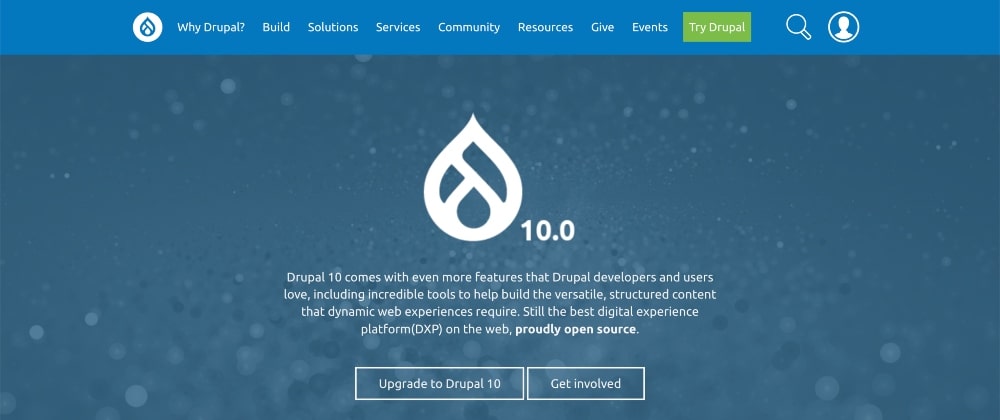
Drupal is an open-source content management system (CMS) and blogging platform used by many businesses, universities, non-profits, and government organizations.
It’s a powerful tool for creating complex websites with advanced features like multilingual support, ecommerce capability, social media integration, and more.
Despite its complexity, Drupal is also easy to use right out of the box and offers an intuitive interface for bloggers of all levels.
Its scalability makes it much easier to grow your blog or website as you add more content or features over time.
Additionally, Drupal has a wide range of themes and plugins so you can customize the design of your blog without coding knowledge. This makes it one of the best blogging platforms for design flexibility.
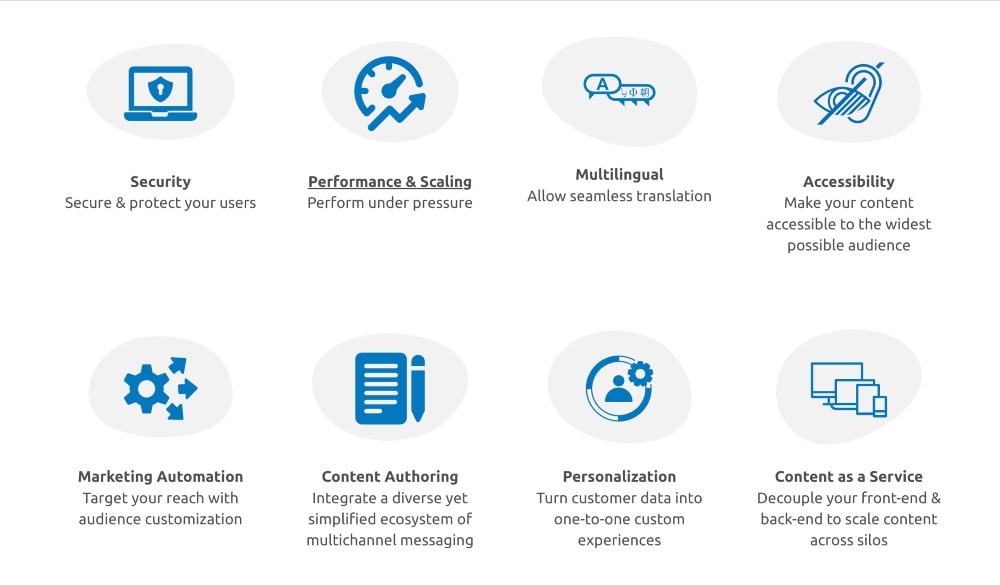
Pros:
- Powerful content management system
- Wide range of themes and plugins to choose from
- Intuitive interface for users of all levels
Cons:
- Steep learning curve and more complex than other blog platforms
- Not the best choice for small businesses or personal blogs
Pricing:
Drupal is free to use.
Our Recommendation
Drupal is a great choice if you need an advanced content management system that supports various features, languages, and extensions.
It’s open-source, so it’s also free to use which makes it attractive for those on a budget. Additionally, its design capabilities are top-notch and highly customizable.
However, this may not be the best free blogging platform for those who are new to blogging since it can be quite complex and may require some coding knowledge.
If you’re looking for something more user-friendly, then we suggest going with a simpler option like WordPress or Wix.
11. Web.com

Web.com is a website builder and blogging platform that makes it easy to create an online presence for your business, organization, or hobby blog.
It offers several features to make designing your blog easier such as customizable templates, drag-and-drop content blocks, SEO features, and more.
Additionally, Web.com provides integrated tools for marketing automation and eCommerce functionality.
The platform also allows you to add a custom domain name and connect it to your blog if you want to give it a professional look.
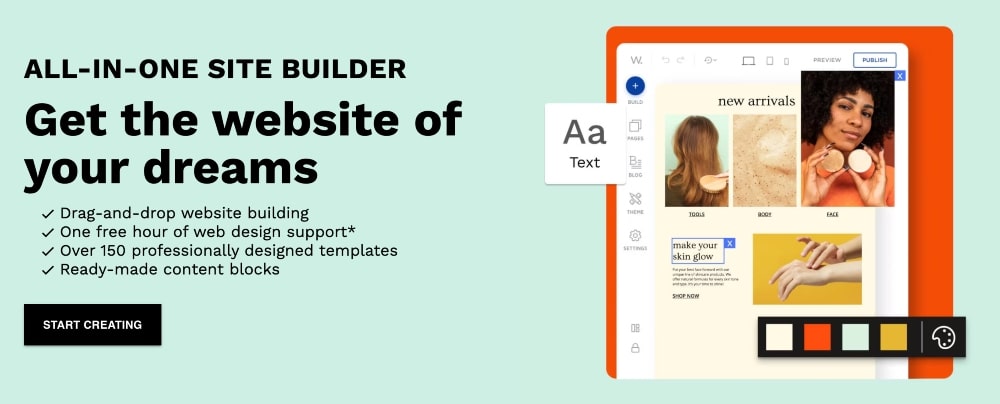
Pros:
- Easy-to-use interface with drag-and-drop content blocks
- Integrated marketing automation tools
- Customizable templates and themes
Cons:
- Limited design customization options
- No access to third-party plugins
Pricing:
Web.com plans start at $4.95/month (billed annually).
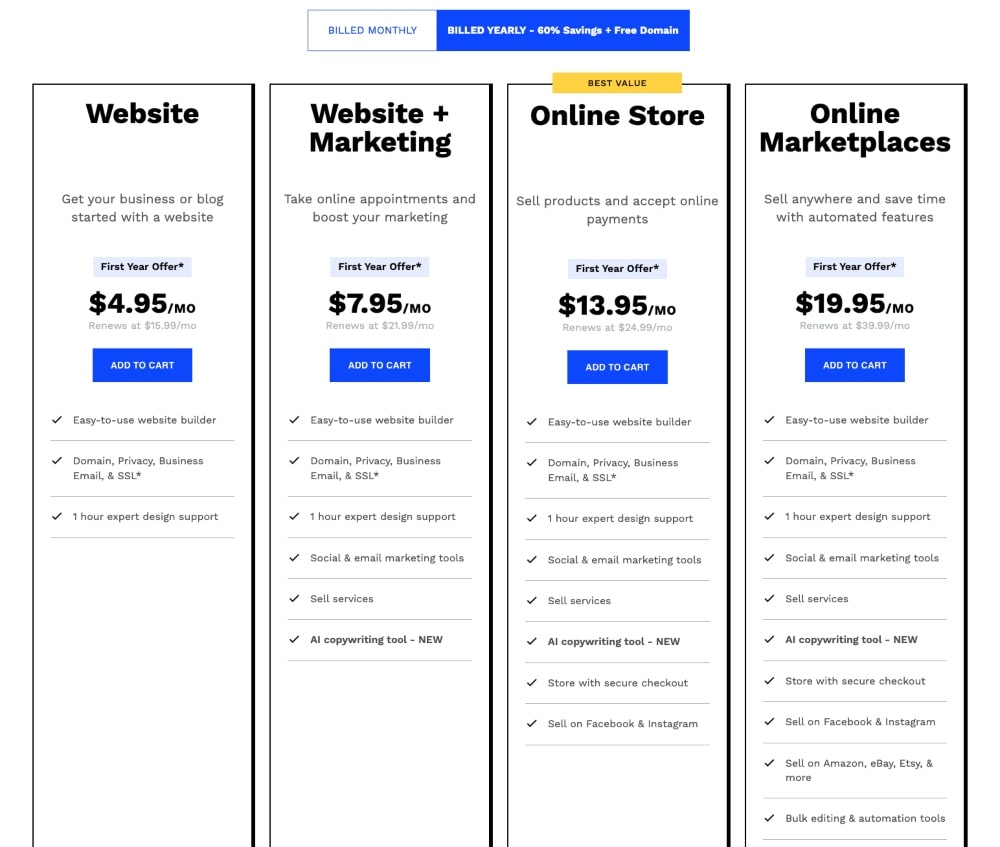
Our Recommendation
Web.com is a great choice if you need an easy-to-use platform for creating a professional website or blog quickly.
It offers several features to make designing your blog easier such as drag-and-drop content blocks and customizable templates. It also has integrated tools for marketing automation and eCommerce functionality, making it attractive for those with business goals.
However, the lack of third-party plugins and limited design customization options may be dealbreakers for some users. If you need more powerful features, then we recommend looking into other blog platforms.
How to Choose the Right Blogging Platform
Choosing the best blogging platform for your needs isn’t always a straightforward task. Each one has unique features and design options that may or may not fit your specific blogging goals.
Purpose of Your Blog
The purpose of your blog is the first thing you should consider when choosing a blog platform.
If you want to create an online business or monetize your blog, then you’ll want to go with a more powerful platform like WordPress or Ghost.
On the other hand, if you’re just starting out and need something quick and easy and you aren’t sure if you will make money from your blog, then Wix or Squarespace may be better options.
Design and Customizations
Every blog platform has different design options and themes, so it’s important to consider how customizable the platform is.
If you want to create a unique look for your blog, then WordPress or Drupal would be your best bet as they offer more customization options than other platforms.
However, if you’re just starting out and don’t need complex features, then Wix or Squarespace may be better choices since they have pre-made templates that are easy to customize.
Other free blogging platforms like Tumblr and Medium have very few customization options.
Features and Plugins
Different blogging platforms also offer different features and plugins. For example, WordPress offers thousands of plugins to help customize your blog while Wix limits you to using its own plugins.
These plugins will impact how you publish content and connect to social media platforms, so it’s worth taking into consideration and looking into what kinds of features each platform offers before making a decision.
Budget
Another important factor you should consider is your budget. Some blog sites are free to use, while others may cost money.
On the other hand, if you want more advanced features and scalability, then you will need a paid plan.
Monetization
If you want to monetize your blog, then it can be helpful to look for platforms that offer built-in features to help you do this.
For example, WordPress has plugins like WooCommerce and Easy Digital Downloads that make it easy to sell digital products or accept donations.
Web.com also offers integrated eCommerce capabilities so you can create an online store with your blog.
FAQs About the Best Blogging Platform
Which is the best platform for blogging?
When it comes to the best blog hosting sites, there is no one-size-fits-all answer. Popular blogging websites such as WordPress, Squarespace, and Blogger offer a variety of features and capabilities, so it’s important to consider your needs and goals before selecting a platform. Some common factors to consider are ease of use, cost, and customization options. Take some time to research the different blog hosting sites available to find a platform that best fits your needs.
What is one of the most popular blogging platforms?
The best blogging platform on the market is WordPress. It’s a free, open-source platform that allows users to create custom websites and blogs quickly and easily. With its extensive range of features, themes, plugins, and customization options, it’s one of the best blog hosting sites available today.
Additionally, there are various paid plans offering additional features and support, making WordPress suitable for both casual bloggers and professional web developers. Other popular blogging websites include Blogger, Tumblr, Medium, and Squarespace.
Can a blog be completely free?
Yes, a blog can be completely free. Many top blogging platforms such as WordPress.com, Blogger, and Tumblr all offer a free account that allow users to create their own blog without any cost. These services provide all the necessary tools and resources needed to set up and maintain a blog at no charge. In addition, some web hosts offer services that allow you to launch and manage your own self-hosted blog for free or at a minimal cost.
How do beginner blogs make money?
Beginner blogs can make money by utilizing a variety of monetization strategies, such as affiliate marketing, selling advertising space on the blog, creating and selling digital products, offering services to readers and leveraging sponsored posts. Building an email list of subscribers and developing relationships with readers can also help you make more money with a blog.
What is a good free blog site?
WordPress.com is a great free blog site that allows users to create custom blogs with a range of features, including customizable templates, an easy-to-use dashboard, and support for mobile and web publishing. It’s one of the most popular free blog sites on the internet for good reason — it makes blogging simple and accessible to anyone. Additionally, WordPress.com offers a range of premium upgrades and features for users who want to take their blogging further.
Which blog site is best for earning money?
The best blog site for earning money largely depends on your specific niche, audience, and monetization strategy. However, WordPress.org consistently ranks as the top choice due to its extensive customization options, ability to host advertising, affiliate linking, and selling digital or physical products. WordPress.org provides the flexibility and control needed for blog monetization, making it highly favored among professional bloggers aiming to generate a substantial income from their blog.
Can you make $1,000 a month with a blog?
Yes, it is entirely possible to make $1,000 a month with a blog, but success depends on various factors including the blog’s niche, the quality of content, the size of the audience, and the monetization strategies employed. To achieve this, bloggers often rely on a combination of advertising revenue, affiliate marketing, sponsored posts, and selling their own products or services. Consistent content creation, SEO optimization, and effective audience engagement are key to building a blog capable of generating $1,000 a month or more.
Which blog makes the most money?
Blogs focusing on finance, personal development, health and fitness, food, and technology are often the most lucrative. Among these, finance blogs typically make the most money owing to high demand for financial advice and the willingness of financial services to pay top dollar for advertising and affiliate marketing.
Finance blogs can generate revenue through various channels such as affiliate marketing, sponsored content, and direct advertising, often surpassing other niches in terms of profitability.
How can I make $100 a month blogging?
Making $100 a month blogging is achievable through a combination of several tactics. Start by focusing on creating high-quality, valuable content that draws in and retains an audience. Implement SEO strategies to increase your blog’s visibility in search results. Monetize your blog by incorporating affiliate marketing links, displaying ads through Google AdSense, or selling digital products and services relevant to your niche.
Active engagement with your audience through comments and social media can further boost your blog’s traffic and income potential. Remember, consistency and patience are key as it takes time to build an audience and generate revenue.
Key Takeaways for the Best Blogging Platforms
When it comes to choosing the best blog hosting platform, you should consider your goals and budget.
If you’re just starting out and don’t want to invest any money or you have a personal blog, Blogger might be the best free blogging platform for you.
If you want a free option that also gives you access to an existing audience and a custom domain name, Tumblr is your best free blog platform.
If you want to make money with your blog, a self-hosted WordPress blog is the best blogging platform for beginners. We recommend Bluehost as one of the best and most affordable hosting options.
Bluehost also comes with a free domain and has automatic WordPress installation during setup.
You can access their entire network of free and premium themes.
If you want the best combination of ease of use and power, Ghost is your best bet.
Wix and Squarespace are the best blog sites for traditional, brick-and-mortar stores or those who only need a website without much blogging functionality.
Whichever platform you choose, make sure it meets all your needs before committing to it!
Here are some other relevant articles for your blogging journey:
- Use our blog name generator to decide on your blog name.
- Step-by-step guide on how to start a successful blog.
- Make Money Blogging: The Complete Guide
We hope that this article helped you choose the best blogging platform for your needs. If you have any questions for us, please feel free to leave them in the comment section below!